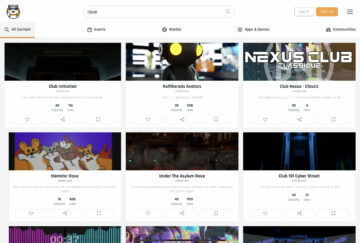
Two U.S. Democratic Senators have called on Facebook (now Meta) founder Mark Zuckerberg to stop plans to open his metaverse platforms to teenagers, citing concerns about the company’s past handling of youth data and privacy.
The call comes as Apple blocked an update to the email app BlueMail, which incorporates aspects of ChatGPT technology, over age restrictions.
In a joint letter to Meta CEO Mark Zuckerberg, Senators Ed Markey and Richard Blumental urged the social media company to drop plans to expand access to the Horizon Worlds application, the flagship social virtual reality (VR) platform set in the metaverse.
Also read: EU Antitrust Chief Steps up Rhetoric on Metaverse, AI Regulation
Meta may open access to Horizon Worlds for users aged 13 to 17 this March as it battles to grow its VR business, according to the Wall Street Journal. The app is currently available to users over the age of 18.
“Meta’s plan to target young people with offerings in the metaverse is particularly concerning in light of your consistent failures to protect young users,” the Senators wrote. “With a documented track record of failure to protect children and teens, Meta has lost parents’, pediatricians’, policymakers’, and the public’s trust.”
Meta target teens to grow user base
Meta intends to release the Horizon Worlds app to teenagers as part of an effort to grow its user base to one million by year-end, WSJ reported, citing an internal memo from Horizon VP Gabriel Aul. He told employees that getting young users on board was top of the agenda.
“Today our competitors are doing a much better job meeting the unique needs of these cohorts,” said Aul, per WSJ. “For Horizon to succeed we need to ensure that we serve this cohort first and foremost.”
Meta, which owns Facebook, Instagram and WhatsApp, is the world’s largest social media firm boasting 3.59 billion active daily users, according to Statista. The company pivoted to the metaverse in 2021, changing its name from Facebook to Meta to reflect the new focus.
However, Meta’s metaverse experiment has gone terribly so far. Reality Labs, the unit tasked with spearheading the company’s metaverse ambitions, posted a loss of $13.7 billion last year, prompting Meta to cut thousands of jobs at the division.
A Meta spokesperson told Business Insider that its Quest VR platform, the VR headset used to access Horizon Worlds, “has always been designed for people ages 13+”. Therefore, “it makes sense” for the company to expand to younger people.
“Teens are already spending time in a variety of VR experiences on Quest and we want to ensure that we can provide them with a great experience in Horizon Worlds as well, with age-appropriate tools and protections in place,” the source told Business Insider.
‘Metaverse threatens teenage well-being’
Horizon Worlds is a “cumulative set of immersive virtual reality experiences” which allows users to be a part of virtual events as well as play games and communicate with others.
In their letter, Senators Markey and Blumenthal criticized Meta for its alleged past misdeeds involving the way the company handled personal information and privacy for children and young adults. They are worried the company poses a threat to the lives of US teenagers.
“Any strategy to invite young users into a digital space rife with potential harms should not be driven by a goal to maximize profit,” the Senators wrote. “We call on you to immediately halt Meta’s plan to bring teen users onto Horizon Worlds.”
The letter speaks of research regarding the vulnerability of users in the metaverse covering privacy invasion, health and physiological issues, and harassment. It added that metaverse users, including children, are “exposed to abusive behavior such as bullying, threats of violence, and sexual content, every seven minutes.”
Senator Markey previously urged the US Federal Trade Commission to look into “companies working to build apps in the metaverse, specifically in regard to the privacy and security of kids,” according to industry media.
Apple blocks BlueMail app update
The Senators’ letter comes as Apple blocked an update to an email application called BlueMail, which uses a customized version of OpenAI’s GPT-3 language model, the tech powering the wildly popular chatbot ChatGPT.
According to Ben Volach, co-founder of app developer Blix, “Apple has blocked the BlueMail update and continues to treat BlueMail unfairly and to discriminate against us. Other GPT-powered apps seem not to be restricted,” he told Reuters.
Apple rejected the update last week and asked Blix to revise the app’s age restrictions for those aged 17 and above, or implement content filtering, per a document seen by Reuters. Blix says several other apps with similar features on the App Store do not have age limits.
“We want fairness. If we’re required to be 17-plus, then others should also have to,” Volach tweeted.
If Apple has a new policy regarding AI, it should be made public and applied to all app developers equally as Tim Cook testified in the congressional hearing.
Apple must not prevent any disruption in BlueMail’s functionality and the launch of our innovative AI service. pic.twitter.com/XKWgXJXwX8
— Ben Volach 💎 (@benvol) March 2, 2023
Apple assessed the complaint and said that developers have the option to challenge a rejection via the App Review Board process. ChatGPT has taken the tech industry by storm, with the likes of Google and Microsoft rushing to release their own versions of the AI bot.
- SEO Powered Content & PR Distribution. Get Amplified Today.
- Platoblockchain. Web3 Metaverse Intelligence. Knowledge Amplified. Access Here.
- Source: https://metanews.com/eu-antitrust-chief-steps-up-rhetoric-on-metaverse-ai-regulation/?utm_source=rss&utm_medium=rss&utm_campaign=eu-antitrust-chief-steps-up-rhetoric-on-metaverse-ai-regulation
- 11
- 2021
- 7
- 9
- a
- About
- above
- access
- According
- active
- added
- adults
- against
- aged
- agenda
- Ages
- AI
- AI regulation
- All
- alleged
- allows
- already
- always
- ambitions
- and
- antitrust
- app
- app store
- Apple
- Application
- applied
- apps
- aspects
- assessed
- available
- base
- battles
- Better
- Billion
- blocked
- Blocks
- board
- Bot
- bring
- build
- bullying
- business
- call
- called
- ceo
- challenge
- changing
- chatbot
- ChatGPT
- chief
- Children
- Co-founder
- Cohort
- commission
- communicate
- company
- Company’s
- competitors
- complaint
- Concerns
- Congressional
- Congressional hearing
- consistent
- content
- continues
- covering
- Currently
- customized
- Cut
- daily
- data
- democratic
- designed
- Developer
- developers
- digital
- digital space
- Disruption
- Division
- document
- doing
- driven
- Drop
- ed
- effort
- employees
- ensure
- equally
- EU
- events
- Every
- Expand
- experience
- Experiences
- experiment
- Failure
- far
- Features
- Federal
- Federal Trade Commission
- filtering
- Firm
- First
- flagship
- Focus
- foremost
- founder
- from
- functionality
- Games
- getting
- goal
- great
- Grow
- handled
- Handling
- harassment
- harms
- Headset
- Health
- hearing
- horizon
- Horizon Worlds
- HTTPS
- immediately
- immersive
- implement
- in
- Including
- incorporates
- industry
- information
- innovative
- Insider
- intends
- internal
- invasion
- invite
- issues
- IT
- Job
- Jobs
- journal
- kids
- Labs
- language
- largest
- Last
- Last Year
- launch
- letter
- light
- limits
- Lives
- Look
- loss
- made
- MAKES
- March
- mark
- mark zuckerberg
- Maximize
- Media
- meeting
- Meta
- Metaverse
- metaverse platforms
- million
- minutes
- model
- name
- Need
- needs
- New
- new policy
- Offerings
- ONE
- open
- Option
- Other
- Others
- own
- owns
- part
- particularly
- past
- People
- personal
- Place
- plan
- plans
- platform
- Platforms
- plato
- Plato Data Intelligence
- PlatoData
- Play
- policy
- Popular
- poses
- posted
- potential
- Powering
- prevent
- previously
- privacy
- Privacy and Security
- process
- Profit
- protect
- provide
- public
- quest
- quest vr
- Read
- Reality
- record
- reflect
- regarding
- Regulation
- release
- Reported
- research
- restricted
- restrictions
- Reuters
- review
- Richard
- Said
- says
- security
- Senate
- SENATORS
- serve
- service
- set
- seven
- several
- Sexual
- should
- similar
- So
- so Far
- Social
- social media
- social virtual reality
- Source
- Space
- Speaks
- specifically
- Spending
- spokesperson
- Steps
- Stop
- store
- Storm
- Strategy
- street
- succeed
- such
- Target
- tech
- tech industry
- Technology
- teen
- teenagers
- Teens
- testified
- The
- The Metaverse
- The Source
- The Wall Street Journal
- their
- therefore
- thousands
- threat
- threatens
- threats
- Tim
- time
- to
- tools
- top
- track
- trade
- treat
- true
- Trust
- u.s.
- unique
- unit
- Update
- us
- US Federal
- us federal trade commission
- User
- users
- variety
- version
- via
- Virtual
- Virtual reality
- vr
- VR Experiences
- VR Headset
- vulnerability
- Wall Street
- Wall Street Journal
- week
- which
- working
- world’s
- worried
- WSJ
- year
- young
- Younger
- Your
- youth
- zephyrnet
- Zuckerberg












